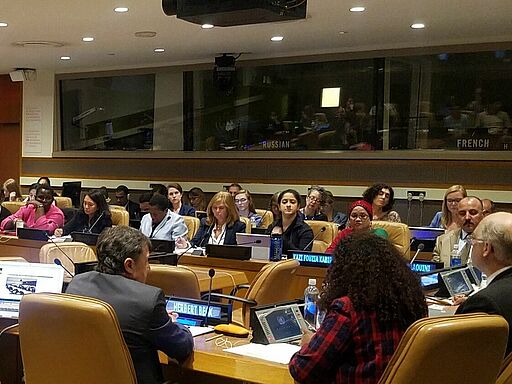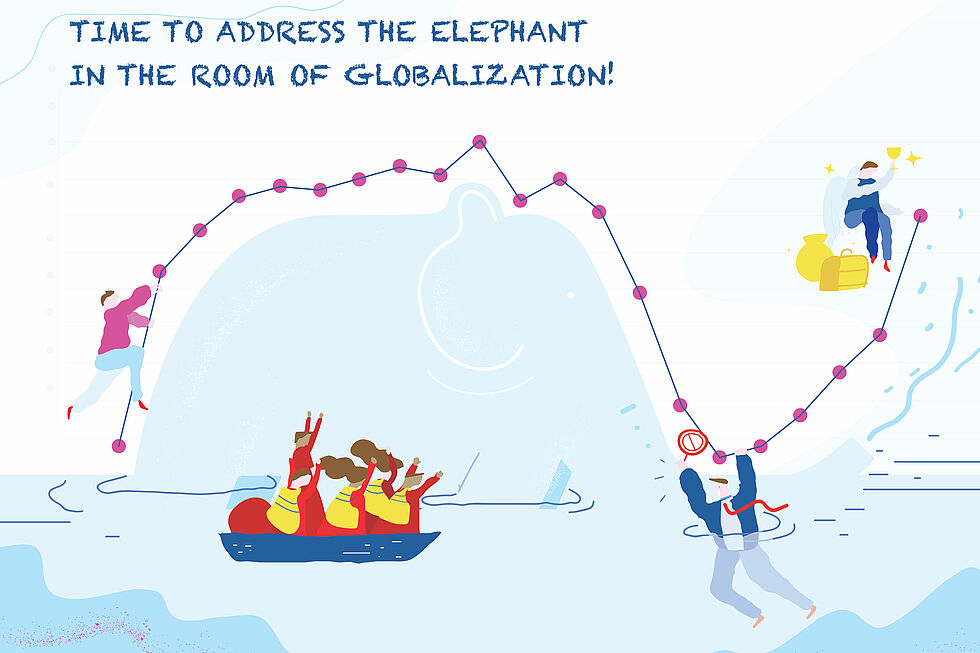The Global Compact for Migration must promote decent work for all
Lack of decent work opportunities at home are a push factor for migration in Latin American countries, with record-setting increases in migration out of Venezuela, Haiti and Central America into South America and northwards, explains Kelly M. Fay Rodriguez, labour rights lawyer, activist and currently programme officer working on the Americas programme at the Solidarity Center.
The pattern Rodriguez draws confirms recent economic analysis of globalization and its consequences, bringing little in terms of opportunities for middle and lower-income populations in developing countries, even when national economies are growing.
Labour migration was the central topic at a side event this May in New York, supported by Friedrich-Ebert-Stiftung and partners, during the United Nations negotiations of the Global Compact for Migration—the first intergovernmental negotiated agreement to cover all aspects of migration.
In this interview, Mariano Schuster of the journal Nueava Sociedad is in conversation with Rodriguez who explains the situation with labour migration in the Americas and the ongoing developments and promises surrounding the latest negotiation round on the Global Compact for Migration.
What is the current situation of migrants in Latin America? What kind of migratory flows can be observed today, what are the motives and what difficulties do migrants face? What is the current situation regarding unemployment, poverty and deprivation that pushes citizens to flee their home countries to improve their living conditions?
Migration is not new to the Americas, but more and more we see migratory “push” factors in origin countries, such as lack of sustainable jobs, climate disasters and general physical and economic insecurity. This are increasingly starting to outweigh the “pull” factors, such as relatively higher wages and job opportunities in destination countries.
Over the last few years we’ve seen record-setting increases in migration out of Venezuela, Haiti and Central America into South America and northward. Unfortunately, people in transit face many kinds of dire obstacles, including economic duress/exploitation, physical and sexual violence, hunger and sadly death. Many migrants also face the risk of additional hardship, harm or violence inflicted on their families if they do not satisfy payments to third parties throughout the route.
"If a worker’s legal migration status depends on their employer, they are far less likely to demand better wages, or report wage theft or unsafe working conditions to authorities."
Some countries have taken important steps to receive, process and support new migrants and refugees, while other governments struggle to adapt existing institutional services and programs to meet the needs of new residents and their destination communities, notwithstanding established international standards and guidance on the topic.
Is there a clear and precise distinction between migrant workers and migration in general? What are the most remarkable migrant workers' experiences in Latin America?
The International Labour Organization (ILO) estimates that in 2013 alone there were 150 million migrant workers (link). Those who migrate under formal labour migration programmes constitute a small subset of the general migrant population. Usually, these programmes provide temporary visas to foreign workers under precarious conditions. Employers tend to prefer them because they ensure a more vulnerable workforce that can be more easily exploited.
If a worker’s legal migration status depends on their employer, they are far less likely to demand better wages, or report wage theft or unsafe working conditions to authorities. Formal programmes for temporary labour migration are also often opportunities for gross human rights abuses, where we find cases of forced labour, debt bondage and other forms of human trafficking.
How can the Global Compact for Migration contribute to the struggle of migrant workers and how could it be applied in Latin America?
The Global Compact on Safe, Orderly and Regular Migration (GCM) poses a significant opportunity for states to weigh in on the importance of state policies and practices that affect migrants. Although it will be non-binding, it will offer standards for countries to consider and has the potential to encourage improvements in the ways states engage with migrant population.
One of the two co-facilitators for the process is Ambassador Juan José Gómez Camacho, permanent representative of Mexico to the United Nations. And while there have been significant strides made to incorporate critical migrant rights and migrant worker protections (including international labour standards) into the draft documents, other states have tried to advance anti-worker and anti-migrant recommendations.
It will be important for trade unions at the local and international levels to remain engaged and active throughout the government negotiations and implementation processes to prevent this and ensure that the Compact’s standards and implementation positively encourages countries to pursue practices that support and defend decent work for migrants and reduce the abuse and exploitation of migrant workers.
What are the main controversies around the Global Compact for Migration? What countries are more progressive and which ones are more conservative? Where did Latin American countries stand on these debates?
The issue of regularization versus amnesty for irregular migrants has been somewhat contentious, which is of great concern for the labour movement since formalization is key to ensuring equal rights and protections, as well as disincentivizing abuse and exploitation of migrants. A few governments who currently provide limited rights for workers in regular temporary migration programmes proposed at the end of the last round of negotiations to eliminate a strong provision that recommended that visa programmes allow workers flexibility in changing employers.
"Latin American countries have offered some of the most progressive positions on protecting migrants and migrant worker rights in the Compact. They are part of a coalition of about 21 countries from the region and a few from Asia that demand decent work for all workers regardless of immigration status."
The labour movement opposes eliminating this language because when workers’ immigration status depends on one particular employer, it makes those workers far more susceptible to abuse and to accept grossly unfavourable or substandard working conditions. Giving employers such heightened control over the legal status of their workers encourages widespread practices of abuse and exploitation and may even lead to slave-like labour conditions.
Latin American countries have offered some of the most progressive positions on protecting migrants and migrant worker rights in the Compact. They are part of a coalition of about 21 countries from the region and a few from Asia that call themselves the “Like-Minded” group of governments. In the negotiations, these countries have voiced compelling demands for clear pathways to regularization, inclusion of rights, and access to social services and decent work for all workers regardless of immigration status.
You have worked extensively on the role of workers' unions in this kind of processes. What is their behaviour nowadays? What kind of policies do they sponsor in order to favour the development of those people who are forced to migrate?
Unions can play a truly decisive role in the lives of migrant workers because as organizations they serve as the bridge between workers with permanent, temporary and irregular immigration status, as well as their families and communities.
"We can raise working conditions for all by raising the floor for those who are most exploited."
At a time when unions are under constant and growing attacks, and union membership is in decline across the hemisphere due to government and employer attacks, it’s even more important for the labour movement to include and prioritize the needs and interests of migrant and other workers of colour who face added systemic and institutional discrimination. We can raise working conditions for all by raising the floor for those who are most exploited. And at their core, unions are intended to unite workers collectively to bring more justice to our workplace and to our lives.
###
About FES Connect
Connecting people, in the spirit of social democracy, we source and share content in English from the German and international network of the Friedrich-Ebert-Stiftung.






